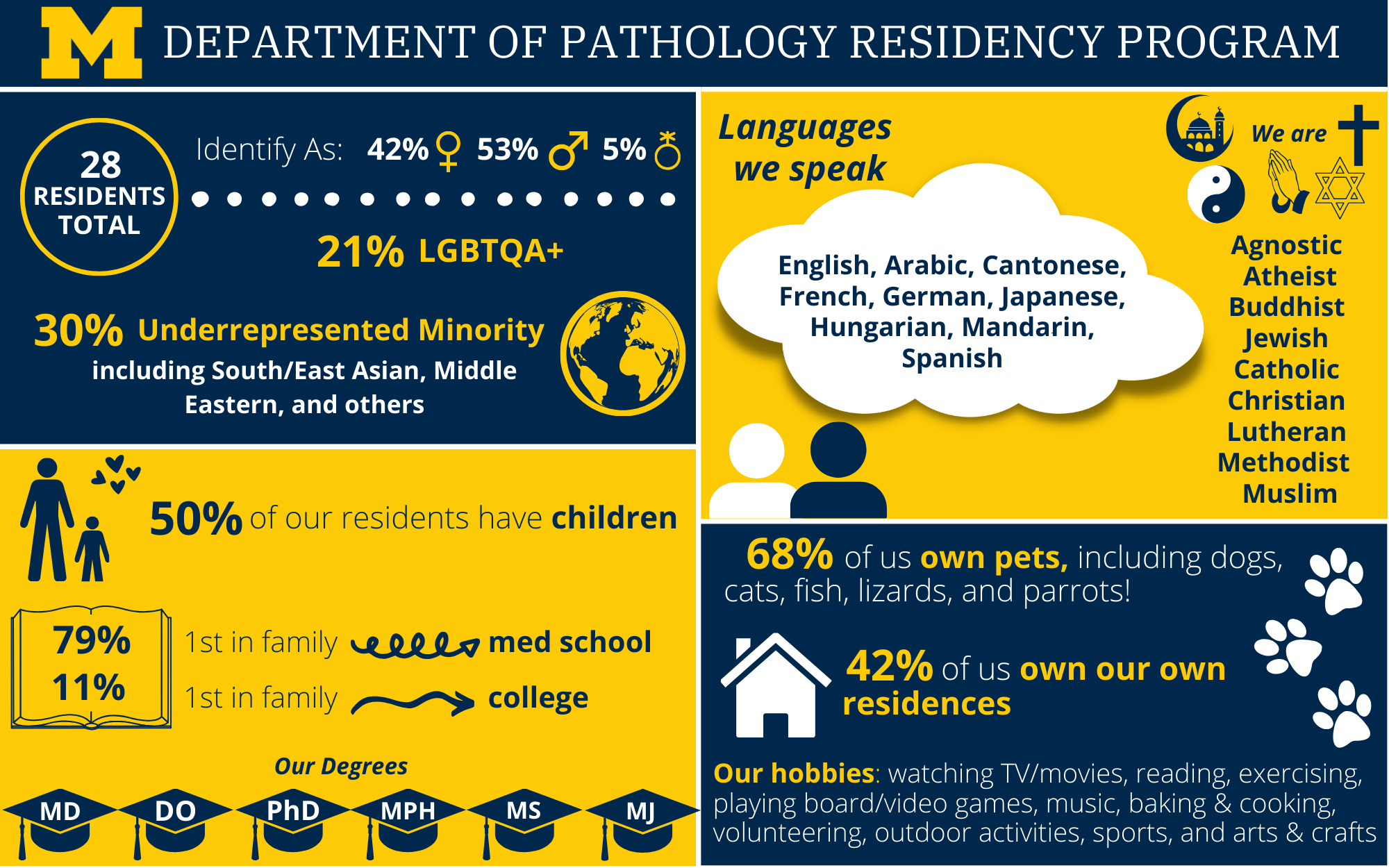

Welcome to the University of Michigan Pathology Residency Program!
Our residency program is designed to cultivate the next generation of pathologists by providing unparalleled training, mentorship, and opportunities for professional growth. Whether you are pursuing Anatomic Pathology, Clinical Pathology, or a combined pathway, our program offers a rigorous and supportive environment where you can thrive.
Our mission is to develop outstanding pathologists who are leaders in clinical practice, research, and education. With the mentorship of our world-renowned faculty and access to cutting-edge resources, you will have the opportunity to explore the full breadth and depth of pathology. From bench to bedside, we are committed to guiding you through every step of your journey.
Here at Michigan Medicine, excellence is not just a goal—it’s a tradition. We are excited to welcome you to a program where innovation meets compassion, and where your potential as a future pathologist will be fully realized. We look forward to supporting your aspirations and working together to advance the field of pathology.
.png)
The Residency Training Program in the Department of Pathology Provides clinical training in the following pathways recognized by the American Board of Pathology:
The combined AP/CP training program is organized in an integrative model where residents alternate between AP and CP rotations throughout their four-year program. Resident training programs are personally designed and formulated to meet professional goals as well as ACGME and American Board of Pathology requirements for training in specific disciplines. Our residents typically have completed medical school within five years of initiating residency training and scored above the national average for USMLE I and II, as well as COMLEX Levels 1 and 2.
Excellence in clinical service and patient care, scholarship, and research are the cornerstones on which the Residency Training Program is based. Education and professional growth are provided in this program through the integration of formal instructional activities in a core curriculum with practical clinical experiences in which residents accept increasing levels of responsibility as they progress through the program. The development of Residents as teachers is considered an important component of their training to prepare them for the unique consulting role Pathologists serve in bridging the domains of basic and clinical science.
Research within the Department is robust and, in terms of NIH funding, represents one of the best-funded Departments in the United States. This includes a spectrum of investigational studies from basic molecular biology to translational biomedical research and clinical investigation. Our faculty continues to expand and represents a dynamic mix of senior faculty who are leading experts in their fields with mid-career and junior faculty with strong academic interests. These strengths obviously provide boundless opportunities for trainees. Research training is available either exclusively as post-doctoral fellowship training or can be linked with clinical training.
Applications for residency training are accepted exclusively through ERAS.
Fellowship training is offered in many of the subspecialty areas of Pathology. We have ACGME-certified fellowships in Blood Banking and Transfusion Medicine, Chemical Pathology, Cytopathology, Dermatopathology, Forensic Pathology, Hematopathology, Molecular Genetic Pathology, Neuropathology, Pediatric Pathology, and Surgical Pathology. In addition, we offer training in the areas of Bone and Soft Tissue Pathology, Breast Pathology, Gastrointestinal Pathology, Genitourinary Pathology, Gynecologic Pathology, Head and Neck Pathology, Informatics, Pulmonary Pathology, and Research. A link for fellowship applications can be found here.
The University of Michigan offers highly competitive salaries and tremendous benefits to our residents/fellows. An overview of salary, benefits, and employment eligibility is available on the GME Office website, under “Prospective Residents/Fellows”.
Medical School
Residency & Fellowship
